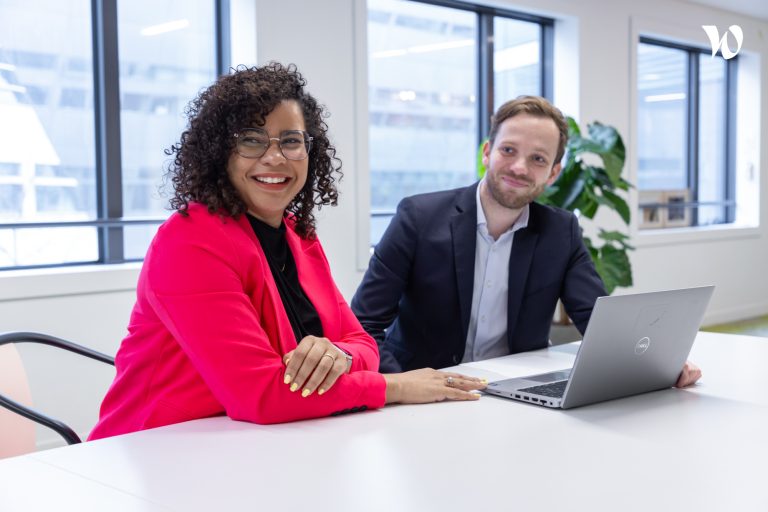Organisational design

Overhauling business and organisational models is now an essential response to change. Organisations are being called upon to redefine the way they operate and (re)align their culture with their raison d’être.
Developing cooperation, reducing time to market, improving customer satisfaction and employee commitment are at the heart of our customers’ concerns. We support them in their transformation projects by amplifying the raison d’être of the projects in order to deploy resilient, responsible and agile models.
Our raison d’être ?
« Transformation objectives no longer focus solely on improving productivity or reducing costs. New organisations must be thought through and designed in a holistic, reasoned and pragmatic way to address all of our customers’ challenges. »
Mathieu COTTIN, Transformation Director

The Axys method
Be pragmatic. Ask the right questions. Your organisation, your ecosystem and your culture are unique! At every stage, we’ll work with you to select the tools and methods best suited to your project.
Framing the ambitions and direction of the project
First and foremost, we attach particular importance to clarifying the pillars and raison d’être of your project. What are the pain points? What is the scope? What are the must-haves? What are the rules of the game? What are the main expected benefits? This initial clarification stage generally takes the form of individual interviews with the project sponsor(s) and the main decision-makers potentially affected. Depending on the level ofalignment of the stakeholders, a group meeting is organised to share and clarify the ambition and the framework.
Our consultants are masters of individual and group coaching techniques, and will be able to ask questions, identify weak signals and support the group in formalising common and (genuinely) shared objectives so that they can begin to tell the story of the project with a single voice.
Understanding what already exists
In-house projects often result in organisations that are ‘out of touch’ with the ground.
We provide the framework and the method, while your experts and colleagues provide the reality on the ground. Beyond the fundamentals of organisational analysis (workforce, job descriptions, skills, processes, management, customer surveys) ….
This project stage will mobilise 4 complementary levers to bring depth and acuity to the analysis
Sharing and aligning project contributors and sponsors on the findings
Multi-disciplinary workshops (incorporating the voice of the customer and partners where possible), using inspiring methods adapted to your culture and based on the themes identified in the project scope (strengths, pride, aspirations, malfunctions and irritants). The analysis of the existing situation should not only stigmatise what is not working, but also highlight the elements of the organisation that have made it work up to now.
Immersions in the field, such as ‘my life, my life’, on the sites concerned, with questioning and an analysis grid.
Analysis of your ‘data assets’ to make your historical data speak for itself (volumes, processing times, quality of service, Satcli, work stoppages, accidents, working hours, employee commitment, etc.).
Defining the range of possibilities and choosing the target best suited to the vision and transformation challenges
The aim of this stage is to identify and explore scenarios, weigh up the benefits, efforts and risks, and then make a choice.
Our business expertise and our constant monitoring of market trends mean that we can feed our thinking with sector benchmarks of best practice.
The exploratory phase with the project group will consist of identifying and refining possible solutions based on the problem (keeping in mind the key issues and objectives defined in the framework). The scenario screening phase will enable the scenarios to be weighed against a multi-criteria grid incorporating the expected gains, the impact and effort of the transformation, the benefits for customers and employees, the contribution of the project to your CSR transition, etc.
The final stage, carried out with the sponsor, the project manager, the main decision-makers in the scope and the HR department, consists of validating the most relevant target. Choosing means renouncing your commitment.
Working closely with the HR contributors from the outset of the project will enable the strategy and tactics for social dialogue to be co-constructed as the project progresses, and will feed into the next stage of preparing for deployment.
On the basis of the target selected, we will refine the various aspects of the target organisation (structure, job descriptions, sizing, elasticity of activity volumes and activity volume stress test) to test the resilience of the model. An organisation cannot be drawn up on the basis of a ‘photo’ at a given moment in time. Structuring and weighing up the target workforce should also enable the model to be put to the test in the event of variations in activity (upwards or downwards) and to incorporate the possible side-effects of seasonality in order to validate the hypotheses and build an agile organisation.
This target will also make it possible to finalise the project’s change management strategy (communication, events, help in choosing the target position, training, support in taking up the position).
At this stage, while respecting the social dialogue milestones, we recommend a cascade of events to convey the meaning of the transformation and present the target organisation and jobs.
- Stage 1: middle management
- Stage 2: local management
Stage 3: all employees affected by the transformation
Defining the roll-out strategy, the trajectory and supporting the transformation
Depending on the depth of the transformation, analysis and choice of scenarios: Trials, POCs, Functional Breakdowns, BIG Bang. A pragmatic approach to deploying the chosen model while ensuring service continuity.
Coordination with those responsible for the prerequisites (processes and IS in particular) is a key success factor for identifying the critical path and correctly scheduling the trajectory, obviously taking into account the incompressible deadlines associated with social dialogue.
There’s the project on paper… and then there’s business news and the unexpected. Our approach aims to bring agility and adaptability to the roll-out trajectory by adapting while respecting the unavoidable milestones.
We provide our customers with support as and when required, whether it’s for the operational management of the transformation, change management, support for social dialogue, defining selection criteria and filling target positions, measuring the achievement of objectives and setting up the virtuous circle of continuous improvement or, more simply, helping the target managers of the new organisation to take up their new positions.
Our customers’ successes
+17 points
‘TOP 2 Box’ and -8 ‘Bottom Box’ customer satisfaction points
7 months after the first transformation rollouts
–30% reduction in processing times
2 months after deployment of the organisation Pilot
90% reduction in ticket backlog
1 year after deployment
Our other types of support
Managerial support
Before being an object of production, the manager is first and foremost a growing subject who needs to be developing in order to be able to develop the potential and performance of others.
Studies and diagnostic
Our approach is based on a rigorous, proven methodology that enables us to work effectively with our customers to identify their needs, analyse their challenges and develop appropriate solutions.
Helping you choose solutions
We help our customers choose solutions in our areas of expertise: Purchasing, Data, Finance, Digital Marketing, Change Management, Project Management, etc.
Project management support (AMOA)
Digital transformation is first and foremost a strategic process, designed to reinvent the company, optimise its performance and meet the growing expectations of its customers.
RPA automation
Axys supports its customers in all phases of improving business performance, whether this involves process robotisation or other technologies.
Change management and training
Whether it’s a technological change, a new business strategy or a move, making a success of your transformations is crucial to the long-term future of your organisation.
Organisational design
Overhauling business and organisational models is now an essential response to change. Organisations are being called upon to redefine the way they operate and (re)align their culture with their raison d’être.
MCO
We can help you with third-party application maintenance (TAM) for your purchasing, finance and HR information systems.
Operational excellence
Operational excellence is a key lever for improving business performance and competitiveness, and is defined as an organisation’s ability to achieve its objectives effectively, efficiently and sustainably.
Project management and support
Against a backdrop of changing working practices, accelerating deployment of technological innovations and the need to reduce time-to-market, project management is becoming increasingly complex and a real key factor in a company’s success.
Performance monitoring
The accelerating pace of economic, technological and regulatory change means that performance management models, processes and tools need to be continually adapted.

Do you have a project in mind ?
Transforming your organization is a complex challenge requiring strategic vision, specific skills and unfailing responsiveness.
Axys is committed to meeting your needs as quickly as possible, and to providing you with customized solutions tailored to your specific challenges.
Join the Axys family
Joining Axys means being part of a collective where we are proud to promote diversity and equal opportunities within our teams. Our differences are our strength!
Are you looking for a new challenge? We offer you an enriching candidate experience based on exchange and transparency. Axys is also an inclusive recruitment process that promotes difference and diversity.
